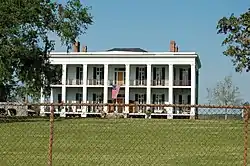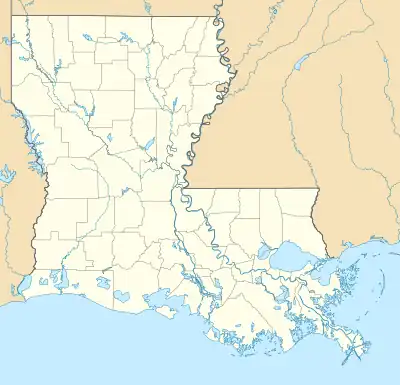Ducros Plantation | |
 The east facade, seen from Old Schriever Hwy | |
  | |
| Nearest city | Schriever, Louisiana |
|---|---|
| Coordinates | 29°45′15″N 90°49′5″W / 29.75417°N 90.81806°W |
| Built | 1859-1860[1] |
| Architectural style | Greek Revival |
| NRHP reference No. | 85002759[2] |
| Added to NRHP | November 7, 1985 |
The Ducros Plantation (a.k.a. Old Jackson Plantation or Polmer Plantation) is a Southern plantation located in Schriever, Louisiana.
Location
The plantation is located in Schriever, Terrebone Parish, Louisiana.[3] It is two miles and a half away from Thibodaux.[4]
History
The land was granted by Spain to Thomas Villanueva Barroso[5] who, 10 years later, sold it to Pierre Denis de La Ronde whose son-in-law, Adolphe Ducros, developed it into the Ducros Plantation.[6][7] In 1845, Ducros sold it to Colonel Van Perkins Winder.[5][8] Winder expanded the acreage by purchasing adjacent land formerly owned by Thomas Butler and smaller farms.[4]
The mansion was built by Winder's widow, Martha Grundy, who was Felix Grundy's daughter, shortly after her husband's death.[1][7] Construction began in 1859 and was completed in 1860.[4] It was designed in the Greek Revival architectural style.[3] Martha hired a Louisiana architect named Evens and told him to model the mansion on The Hermitage, Andrew Jackson's plantation home in Nashville, Tennessee.[4] Indeed, she had grown up in Nashville.[4]
During the American Civil War of 1861–1865, the mansion was saved from a fire by Union General Godfrey Weitzel.[4] However, the outbuildings burned down.[4] Meanwhile, the fields were used as a camping ground by the Confederate States Army and the Unionists.[4] The Texas Rangers hoisted Bonnie Blue Flag, a flag of the Confederate States of America, on top of the house.[4]
In 1872, the plantation was purchased by two brothers, R.S. Woods and R.C. Woods, who were married to two sisters, Maggie Pugh and Fannie Pugh.[4] It became known as the Old Jackson Plantation.[9] It is two-story high, with a white facade.[1]
It was purchased by Samuel and Leon Polmer in 1909.[10] It was later inherited by Leon Polmer's sons, Irvin and Marvin.[10] In 1974, it was inherited by J.L. Fischman of New Orleans.[11]
The plantation is now owned by the Bourgeois family.[11] It was featured on If These Walls Could Talk, a television program on HGTV, in 2002.[11] Old wood with inscriptions about the secession of South Carolina and the presidential run of Stephen A. Douglas in 1860 have been found on the property.[11]
Heritage significance
It has been listed on the National Register of Historic Places since November 7, 1985.[3]
References
- 1 2 3 "Ducros Plantation House" (PDF). www.crt.state.la.us/dataprojects/hp/nhl/index.asp. Louisiana Office of Cultural Development. Retrieved 19 March 2015.
- ↑ "National Register Information System". National Register of Historic Places. National Park Service. July 9, 2010.
- 1 2 3 National Register of Historic Places
- 1 2 3 4 5 6 7 8 9 10 "The Louisiana Digital Library: Ducros Plantation". Archived from the original on 2015-04-02. Retrieved 2015-03-24.
- 1 2 Anne Butler (ed.), The Pelican Guide to Plantation Homes of Louisiana, Gretna, Louisiana: Pelican Publishing, 2009, p. 60
- ↑ Byrd, Brandon African American Intellectual History Society: "Finding Toussaint L’Ouverture in Tennessee"; 20 July 2017.
- 1 2 Louisiana Writers' Project, Louisiana: A Guide to the State, North American Book Distribution, 1 Jan 1941, p. 580
- ↑ Fred Daspit, Louisiana Architecture, 1840-1860, Center for Louisiana Studies, University of Louisiana at Lafayette, 2006, p. 268
- ↑ Old Jackson Plantation home, owned by a sugarcane planter. Schriever, Louisiana, Library of Congress
- 1 2 Encyclopedia of Southern Jewish Communities - Houma, Louisiana, Goldring / Woldenberg Institute of Southern Jewish Life
- 1 2 3 4 Thad Angelloz, Local plantation lives on thanks to couple's restoration efforts, The Daily Comet, May 4, 2008